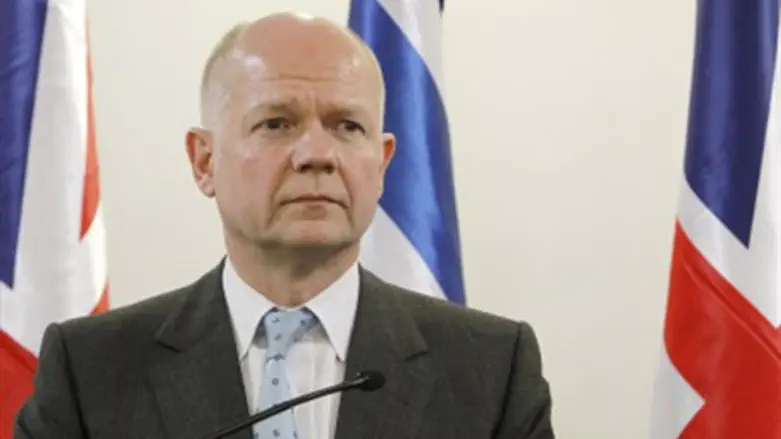
British Foreign Secretary William Hague said on Thursday that peace between Israel and the Palestinian Authority is a "priority," warning that time was running out for a two-state solution.
"The prospects of a two-state solution cannot be kept alive forever as the situation changes," he told reporters in Ramallah, according to the AFP news agency.
"The two-state solution does not have much longer, there is not much more time in which it could be brought about," he emphasized.
Hague's visit to Ramallah followed a meeting between PA Chairman Mahmoud Abbas and U.S. Secretary of State John Kerry, the fourth visit of the top U.S. diplomat to the region since he took office in February.
Hague said that Britain supported Kerry's efforts, urging him to keep up "momentum."
"We ask the U.S. to make an immense effort... to bring new momentum to the Middle East peace process," he said, according to AFP.
"In the UK and the EU we strongly support (Kerry's efforts)," Hague added.
"We believe that it is essential to bring about a two-state solution .... based on the 1967 borders with agreed land swaps, with Jerusalem as the shared capital of both states, with a fair and agreed settlement for refugees," he said.
Ahead of a meeting with Israeli Prime Minister Binyamin Netanyahu in Jerusalem earlier in the day, Hague had stressed the importance of the "Middle East peace process," which he called "an urgent priority for the United Kingdom and to the world."
In his remarks in Jerusalem, Hague also noted Britain's "very strong concerns" over "the nuclear program of Iran," which Netanyahu called "the biggest challenge of our time."
"We pursue... sanctions and negotiations, but nobody should doubt our resolve in these matters," Hague said.
Netanyahu also expressed his condolences for the "horrific terrorist attack against a British citizen in London," a reference to the gruesome murder of a soldier in the British capital on Wednesday.
At a meeting with U.S. Secretary of State John Kerry Thursday morning, Netanyahu said that Israel was very interested in reopening negotiations with the Palestinian Authority. A spokesperson in the Prime Minister's office said that the discussions were “positive,” and that Israel had urged Kerry to do what he could to convince the PA to return to the negotiating table.
Direct peace talks collapsed shortly after they were launched in September 2010 because Abbas refused to talk to Prime Minister Binyamin Netanyahu, despite the fact that Israel imposed a ten-month construction freeze under U.S. pressure.
Instead, Abbas has imposed endless preconditions on talks, the latest ones being having recently told Kerry that Israel should freeze construction in Judea, Samaria and eastern Jerusalem and release terrorist prisoners, especially those arrested before the 1993 Oslo Accords, before any resumption of peace talks.
